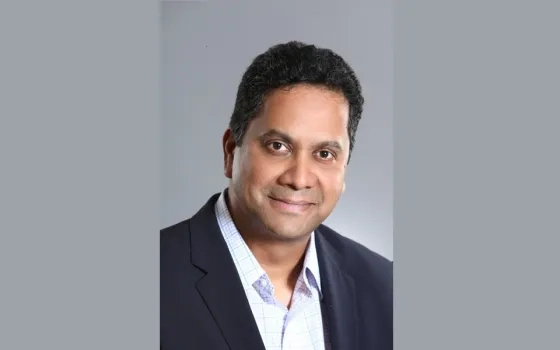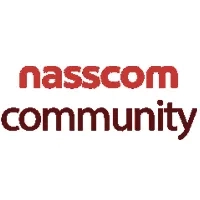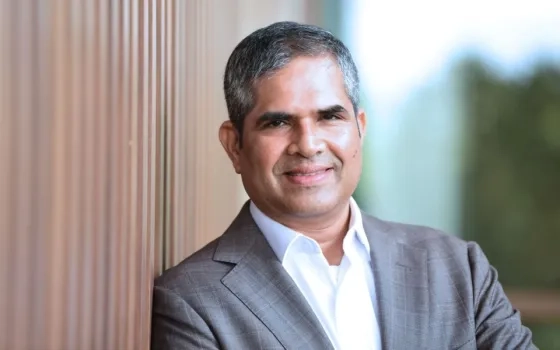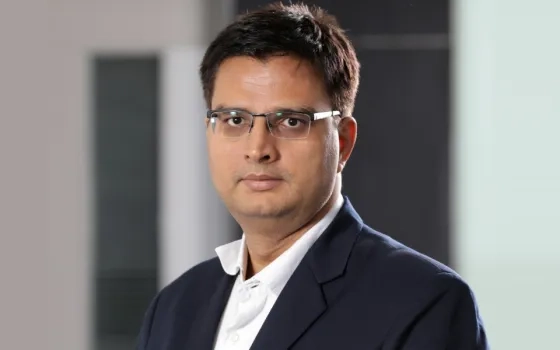
NASSCOM staff writer in conversation with Ravi Kumar, Senior Vice President, Global Delivery Services, NTT DATA Services.
The IT Services industry in India at nearly 80 billion USD can be said to be the mainstay of the 154 billion (USD) IT BPM industry. Spanning across several decades, it has really put the nation in a preeminent position globally. Inasmuch, industry-wide best practices, talent etc. have had their celebratory run too. At present, compelled by the sweeping forces of disruption, once again, it has to change. Touted as the 4th Industrial Revolution, this one will be very different from the previous three. The rate of change in technology is happening at an incredible pace and the constant re-skilling as a means to survival seems to be playing a never-ending catch-up routine. The proverbial “inflection point” is where the industry is at the moment and at NASSCOM we are most confident of riding this wave too, quite successfully, as we have done in the past. Against this backdrop we engaged in a conversation with our leader for this week’s edition. So let’s peep inside the crucible.
- The journey of NTT DATA Services in India and his own narrative weaved in as well.
The company has been dynamic in the true sense of the word, as evidenced by the number of M&A deals that have dotted its corporate history. The most prominent ones with Caritor and Keane, have played a major role in shaping the entity that it is today.
Mr. Kumar is a seasoned executive with a deep-rooted process knowledge and over two decades of IT Services industry experience. He began his career as a team lead with IT Solutions and gradually climbed up the ladder to create a niche for himself. A little later you will read his interesting perspective on what the “ladder” looks like today, in a corporate environment, and, life in general. Mr. Kumar now heads the Global Delivery Services, at NTT DATA (India). Before NTT DATA, he spent many years with Tata Consulting Services.
- His thoughts, on the evolution of IT Services in India.
A trip down memory lane to the time of Y2K or the dotcom bubble even (and burst subsequently), the common thread has always been about transformation & adaptation. That bit continues but with a change. As mentioned in the preamble, the pace of change right now is extraordinarily rapid and nothing like what was seen in the past. This in turn has created a great divide between “old jobs” vis-à-vis “new jobs.” Complexity is amplified because this gap is widening and the time to adapt is only shrinking.
The obvious answer is re-skilling. But, it cannot be based on any particular event (however impactful). This is because it isn’t easy to do (fashionable to pontificate otherwise) and both the individual & the organization are equally accountable to make it happen. It calls for massive change and structural adjustments. In earlier times, a career was likened to a ladder and progress was determined by movement up the rungs, in a linear fashion. And now, welcome to the era of rock climbing! If it was predictive earlier, based on tenure, then today it’s about performance. And, the measuring metrics have also changed dramatically.
3. NTT DATA’s response to this change.
There are two ways of looking at this change. One, and that can be initiated by the company – making the employees future ready. Two, when seen from the individual’s standpoint – about future proofing oneself.
NTT DATA proactively trains people across the company in latest technologies – Machine Learning being a specific case in point. Multiple Certifications ensure that talent is ready and benchmarked.
At the same time, this cannot be a one-time exercise. The individual needs to develop a mindset which seeks innovative solutions all the time. Gather learning from varied industries and be able to apply in their specific fields as well. A sense of curiosity at all times and be customer-focused. These qualities would entail future-proofing.
There are so many new technologies that are growing popular by the day and it’s very difficult to predict which ones will sustain. Right now, Cloud Computing is on a very strong ground and companies are betting big on its future opportunities. The discernible shift from labour arbitrage to value creation has already happened and being driven by platformized solutions, helping end customers streamline their businesses.
4. On managing talent in a dynamic environment.
It would be naïve to expect that experienced talent with niche capabilities (customized) may be readily available in the market, and in great numbers. Since, that may not be plausible any longer, the lookout is for people with basic competencies in place and who have a hunger to learn new things. They may have been rooted to a particular technology for many years but are they willing to change and re-skill themselves? In the Services sector, flexibility and strong customer orientation are sought after qualities.
5. A slew of new technologies have captured popular mindshare, from an Indian market standpoint which would be the top 2?
India is a price sensitive market and this is true for technology as well. Ideas which can eventually benefit from economies of scale, will work. Clean renewable energy, especially solar should be a strong bet for future. And supporting technologies (like solar-powered cars) should work well too.
Risk appetite of Indians is very high, as seen from the spurt in on-line transactions. The numbers, mind-boggling as they are, also result in a high degree of cybersecurity risk. This is the other big “opportunity” which will amplify many times over in the next few years.
6. The recent debate on “Data Colonization” and how is it expected to play out in future.
Ultimately, the consumer is going to benefit. They are already doing so. At the same time, the risks attached are getting more pronounced by the day as few tech giants continue to hoard customers’ data. Policy interventions are much required – if data be the new oil then it isn’t desirable that the system breeds monopolistic practices. Even unwittingly. That balance has to be maintained.
7. Sensitivity of job losses.
Retrenchment, often unavoidable and it’s not something which organisations would like to do. Compelled by business needs, the bitter pill will have to be swallowed at some point in time. It may lead to a sense of isolation and can affect the overall impact of the company, if it isn’t effectively handled. Also, it is naïve to believe that only the IT industry is faced with it today. Other traditional sectors haven’t been spared either. On the other hand, unionism, deflects the real concern areas, which has to be about re-training and keeping the hunger alive – that of a learning organization.
At NTT DATA, a lot of care is taken at the entry level itself and over-staffing is avoided. Also, the focus is always on the customer – issues just don’t solve by themselves. It’s a relationship built on trusted partnership.
8. Anything that may have been done differently.
He has no regrets whatsoever. He is often reminded of what his father used to say: “No matter what decision you take, in hindsight you are most likely to regret it.”
Though, he did mention about a certain US-based product company which he could have joined in the early part of his career, a company which eventually grew to be very big and powerful. “But that was a very long time ago”, he quipped back almost instantaneously.
9. Leadership Mantra
Leadership is about influencing. The leader should lead by example from the front and be able to think for the future.
10. What sets Millennials apart?
- They are generally unafraid of taking risks, making changes. This is what the industry needs right now.
- A mindset for entrepreneurship.
11. NASSCOM IT Services Council – what should it do to create a sense of WOW?
- Right now the industry is in a precarious position and the Council should create a platform which is able to make employees future ready. This initiative should be able to scale up as well.
- Some of the SME companies today are disrupting the industry rapidly – we have to engage with them in a deeper manner. This can happen, if we are able to foster an appropriate eco-system.
Want to read the other interviews in the series? See them with














